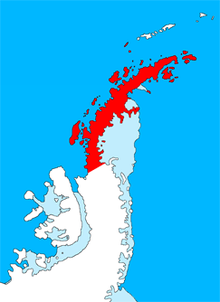
Back Grahamland ANG أرض غراهام Arabic Qreyam Torpağı Azerbaijani Земя Греъм Bulgarian Douar Graham Breton Terra de Graham Catalan Grahamova země Czech Graham Land Danish Grahamland German Lando de Graham Esperanto
66°00′S 63°30′W / 66.000°S 63.500°W


1 Antarctic Peninsula, 2 James Ross Island, 3 D'Urville Island, 4 Joinville Island, 5 Dundee Island, 6 Snow Hill Island, 7 Vega Island, 8 Seymour Island, 9 Andersson Island, 10 Paulet Island, 11 Lockyer Island, 12 Eagle Island, 13 Jonassen Island, 14 Bransfield Island, 15 Astrolabe Island, 16 Tower Island

Graham Land is the portion of the Antarctic Peninsula that lies north of a line joining Cape Jeremy and Cape Agassiz. This description of Graham Land is consistent with the 1964 agreement between the British Antarctic Place-names Committee and the US Advisory Committee on Antarctic Names, in which the name "Antarctic Peninsula" was approved for the major peninsula of Antarctica, and the names Graham Land and Palmer Land for the northern and southern portions, respectively. The line dividing them is roughly 69 degrees south.
Graham Land is named after Sir James R. G. Graham, First Lord of the Admiralty at the time of John Biscoe's exploration of the west side of Graham Land in 1832.[1] It is claimed by Argentina (as part of Argentine Antarctica), Britain (as part of the British Antarctic Territory) and Chile (as part of the Chilean Antarctic Territory).
Graham Land is the closest part of Antarctica to South America.[2] Thus it is the usual destination for small ships taking paying visitors on Antarctic trips from South America.[3] (Larger ships are not allowed to disembark passengers.)
Until the discoveries of the British Graham Land Expedition of 1934–1937, it was generally supposed to be an archipelago rather than a peninsula.[4] The mountains of Graham Land are the last range of the American Cordillera, the almost continuous sequence of mountain ranges forming the western "backbone" of North America, Central America, South America and the Antarctic Peninsula.
Argentina calls the area Tierra de San Martín (Land of San Martin)[5] and also calls the northern peninsula (Trinity Peninsula) Península Trinidad or Tierra de la Trinidad. Similarly, Chile calls the entire Antarctic Peninsula Tierra de O'Higgins (Land of O'Higgins).[5]
- ^ Stanton, William (1975). The Great United States Exploring Expedition. Berkeley: University of California Press. pp. 147. ISBN 0520025571.
- ^ ESA Science & Technology: Graham Land
- ^ "A cruise to Antarctica is a trip like no other". The Daily Telegraph. Archived from the original on 2022-01-24.
- ^ McGonigal, David (2009). Antarctica: Secrets of the Southern Continent. London: Frances Lincoln Ltd. ISBN 978-0-7112-2980-8.
- ^ a b Антарктический полуостров, an article from Great Soviet Encyclopedia.